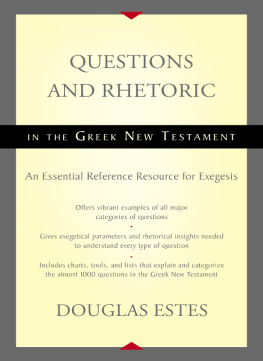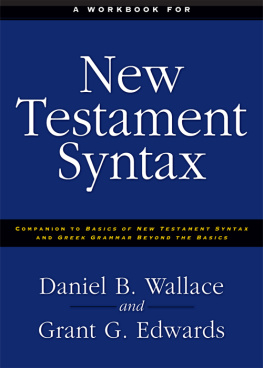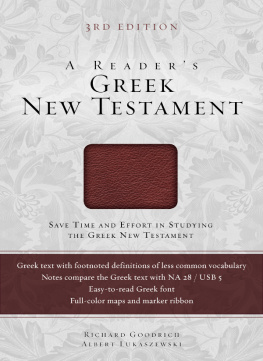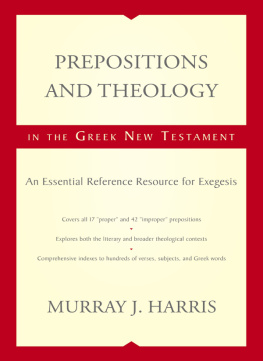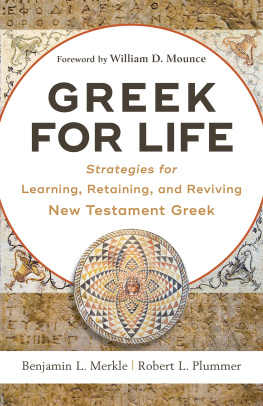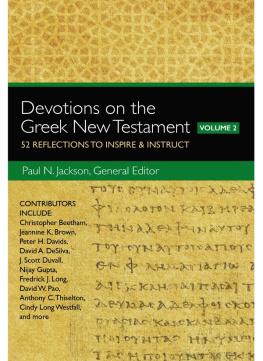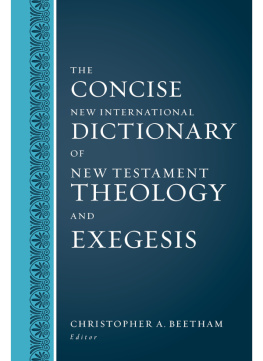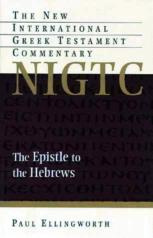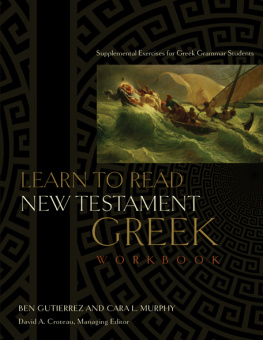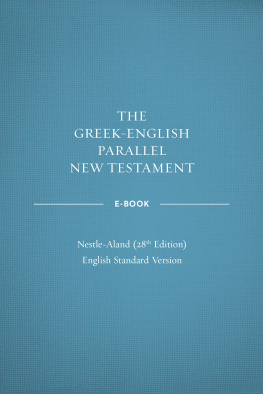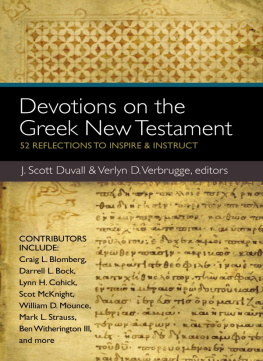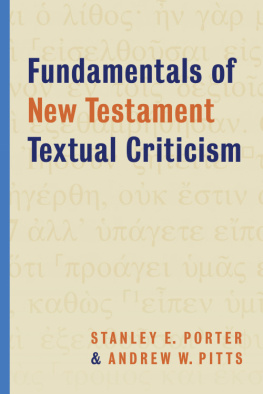Douglas Estes has written a very useful book. Not only will readers now see old questions in a new light, but they will also be prompted to ask new questions for the first time. The technical language and theoretical categories that drive the book are shown to have clear payoff in understanding the text of the New Testament in a new light. Especially interesting here are the case studies that conclude each section, where Estes shows us with great care and precision just how much is being asked by the different types of questions in the New Testament.
G EORGE L. P ARSENIOS , Associate Professor of New Testament, Princeton Theological Seminary
Recognizing that questions are both central to ancient rhetoric and often overlooked in contemporary exegesis, Estes offers an expansive interdisciplinary treatment of questions in the Greek New Testament against the backdrop of grammatical theory, linguistics, and historiography, among other disciplines. He develops in much greater detail his previous research on the questions of Jesus in the Gospel of John, and in the process provides students, scholars, and pastors with an incredibly useful tool for exegetical research. Writing with the precision of an expert, the nuance of a skilled teacher, and the sensitivity of an exegete, Estes introduces the reader to the twenty-eight linguistic features of question asking, the four major formations of questions, and the thirty-six question types found within the NT. This impressive book represents an important achievement in the study of NT Greek and deserves to be among the required texts for advanced courses in Biblical Greek grammar. I cannot recommend this book highly enough!
C HRISTOPHER W. S KINNER , Associate Professor of New Testament & Early Christianity, Loyola University Chicago
Questions are powerful rhetorical devices, but surprisingly they have not been the subject of rigorous scholarly examination until now. Estes, who has already established himself as an authority on the subject of questions in the Gospel of John (Brill, 2012), now extends his unique insights to the entire New Testament. Using a helpful taxonomic approach to the numerous questions in the Greek New Testament, Estes introduces his readers to the logic of questions in the text and their rhetorical effect, leading to a rounder reading of the New Testament.
C ORNELI S B ENNEMA , Senior Lecturer in New Testament and Academic Dean, Union School of Theology, UK
Too often insufficient attention is paid to the logic of questions in the New Testament with the result that both exegesis and theological reflection are impoverished. Douglas Estes, in this interdisciplinary study, provides an excellent, user-friendly resource for analysing and understanding questions in the New Testament. I am sure it will prove to be an important exegetical aid for those engaged in a serious study of the New Testament, be they students, ministers, teachers, or established scholars.
R ICHARD H. B ELL , Professor of Theology, University of Nottingham
This is an exceptional book. It addresses an issue that most of us do not spend much time considering, namely, the questions of the New Testament. But questions give shape to the rhetoric of the text in ways we fail to appreciate, not to mention the fact that fifteen percent of the New Testament involves questions of various kinds. Estes writes with linguistic and academic savvy while remaining very clear, offering helpful examples and illustrations. If you have never questioned New Testament questions or even if you have this book will prove enormously useful.
C ONSTANTINE R. C AMPBELL , Associate Professor of New Testament, Trinity Evangelical Divinity School
Just as questions bear significant rhetorical import within our conventional discourses, they play crucial roles within written texts. While Christian preachers and teachers may have learned well how to do exegesis of declarative statements, the rhetorical and semantic implications of questions have often eluded them, with detriment to their teaching and preaching. A conspicuous vacancy in exegetical studies is filled with Questions and Rhetoric in the Greek New Testament, a thorough, even if not exhaustive, exegetical guide concerning the rhetoric and semantics of questions in the Greek New Testament.
A RDEL B. C ANEDAY , Professor of New Testament & Greek, University of Northwestern St. Paul
Im delighted to see Douglas Estes deploy his considerable scholarly gifts and expertise in Greek rhetoric in this comprehensive yet accessible volume. This is a treasure trove for students and scholars alike. But Im especially excited for pastors and Bible teachers to have this resource at their fingertips in sermon and teaching preparation. A wonderful resource.
T ODD W ILSON , Senior Pastor, Calvary Memorial Church
ZONDERVAN
Questions and Rhetoric in the Greek New Testament
Copyright 2017 by Douglas Estes
Requests for information should be addressed to:
Zondervan, 3900 Sparks Dr. SE, Grand Rapids, Michigan 49546
ePub Edition February 2017: ISBN 978-0-310-52508-0
All Scripture translations in the book, unless otherwise noted, are the authors own.
Any Internet addresses (websites, blogs, etc.) and telephone numbers in this book are offered as a resource. They are not intended in any way to be or imply an endorsement by Zondervan, nor does Zondervan vouch for the content of these sites and numbers for the life of this book.
All rights reserved. No part of this publication may be reproduced, stored in a retrieval system, or transmitted in any form or by any means electronic, mechanical, photocopy, recording, or any other except for brief quotations in printed reviews, without the prior permission of the publisher.
Cover design: Tammy Johnson
Interior illustration and production: Beth Shagene
Interior design: Matthew Van Zomeren
17 18 19 20 21 22 /DHV/ 22 21 20 19 18 17 16 15 14 13 12 11 10 9 8 7 6 5 4 3 2 1
for Violet
Contents
| ACNT | Augsburg Commentary on the New Testament |
| AJSL | American Journal of Semitic Languages and Literature |
| AS | Aramaic Studies |
| BDF | Blass, Friedrich, Albert Debrunner, and Robert W. Funk. A Greek Grammar of the New Testament and Other Early Christian Literature. Chicago: University of Chicago Press, 1961. |
| BECNT | Baker Exegetical Commentary of the New Testament |
| Bib | Biblica |
| BibInt | Biblical Interpretation Series |
| BNTC | Blacks New Testament Commentaries |
| BRLA | Brill Reference Library of Judaism |
| BZNW | Beihefte zur Zeitschrift fr die neutestamentliche Wissenschaft |
| CBQ | Catholic Biblical Quarterly |
| CCTC | Cambridge Classical Texts and Commentaries |
| CDL | Cambridge Dictionary of Linguistics |
| ClQ | Classical Quarterly |
| CP | Classical Philology |
| CSLI | Center for the Study of Language and Information |
| diss. | dissertation |
| ErIsr | Eretz-Israel |
| ESV | English Standard Version |
| GNT | Greek New Testament |

